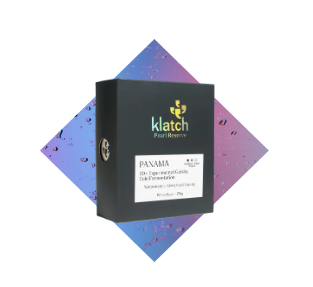
About this Coffee
Volcan Valley is developing a coffee processing center to showcase its work, The Experimental Cold Fermentation brings out watermelon, kiwi and hard candy to this 90+ Geisha.
Drawing on decades of producing championship-level coffees at Ninety Plus, Volcan Valley works with volume geisha, caturra, catuai, SL28, pacamara, and other varieties (some from The Barú Project but primarily from neighboring coffee producers in the region) to add value to coffee cherries through its innovative and often proprietary processing methodologies, much like a great winemaker creates wine from grapes sourced from others that benefit from good farming practices in attractive terroirs. In addition to scaling the volume and making competition-level coffee more accessible, offering co- processing services to neighboring coffee producers who don’t own facilities or the necessary equipment to support Volcan Valley’s methods.
This lot was harvested on 13-Feb-2023 from our Estate #128, located on the northern side of Gesha Estates at an elevation of 1,480 meters, with a total area of 0.45 ha. Trees on this estate are six years old, considered their mature age for production and flavor. Processing for this coffee is a twist on the CriolicTM process and utilizes both leaves and cherries (Criolic FoliioTM) in the fermentation of 48 hours. Coffee was dried for 31 days in Red Room, three days as a single layer, then combined to dry at 3 cm depth and hand stirred throughout the day for an additional 28 days.
CriolicTM processing is a method of coffee processing that utilizes low temperatures to decelerate the decomposition of sugars and other complex proteins in the coffee mucilage. This process starts with freshly picked coffee cherries, stored at low temperatures using water or other means. During the CriolicTM process, the coffee cherries are exposed to cold temperatures in an oxygen-controlled environment, usually around 4 to 10 degrees Celsius. The oxygen- controlled environment can significantly impact the flavor profile of the resulting coffee. The oxygen levels during the processing stage can also significantly impact the flavor profile of the resulting coffee. By controlling the oxygen available during fermentation, the bacteria present in the coffee cherries can produce unique flavors and aromas not found in coffee processed using traditional methods. Once the processing stage is complete, seeds are placed to dry into a single-layer formation not exceeding 2cm in thickness in raised African beds in the Red Room. Afterward, seeds are placed on the top level until they reach 18% humidity and then gradually moved to the lower levels to extend drying time. They are agitated every 2 hours during the daytime to ensure homogeneous drying and avoid hot spots during the drying period. Typically, drying takes 20-25 days until coffee in parchment reaches 11.5% humidity. The resulting coffee beans are known for their unique and complex flavor profile, often with notes of berries, yellow tropical fruits, and even floral characteristics. CriolicTM processing can produce a coffee that specialty coffee enthusiasts covet, as it offers a unique and distinctive flavor profile not found in coffee processed using traditional methods.
The first ever coffee produced using this method is the legendary Batch #227 from the 2017 Harvest from Gesha Estates in Panama, which won the 2017 World Brewers Cup in Budapest. Two years later, a twist of this process, using Saccharomyces Cerevisiae yeast, was used to conquer the 2019 World Brewers Cup in Seattle.
PROCESSING STYLE: CRIOLICTM FolioTM is not a stand-alone processing method like the ones described above. It’s instead an additional layer that can be added into different processing methods (e.g., Washed) to provide more depth and complexity. We use FolioTM to describe the use of one or more parts of the coffee plant (e.g., leaf, cherry, flower, etc.) in the process, and it’s an indicator of the level of processing specialization that Ninety Plus has been known for since 2014. The first ever coffee released with this exact layer in its processing was Ninety Plus’s well-known Yuzo in 2020. FolioTM versions processes have been used to win numerous national championships over the last three years worldwide.